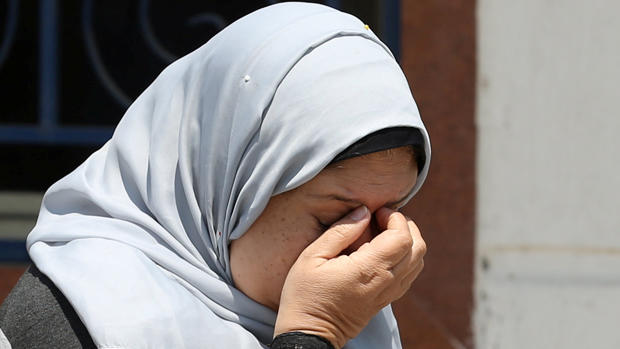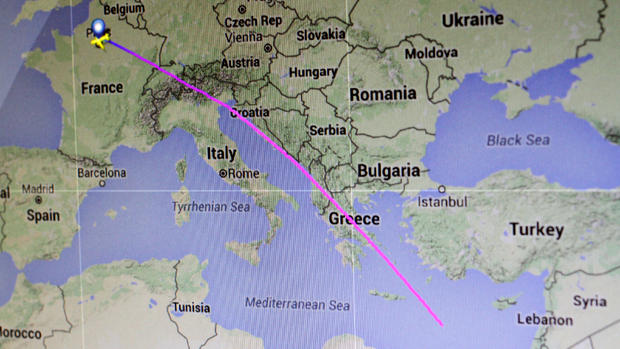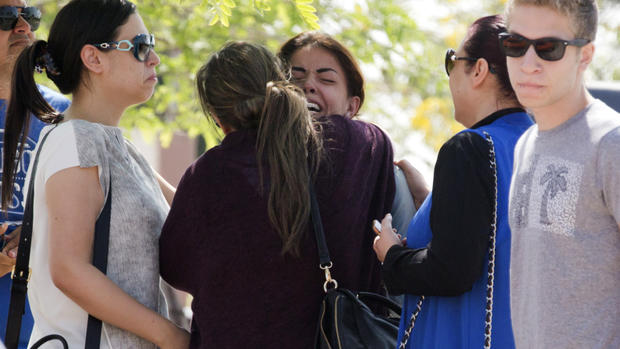EgyptAir crash deemed more likely terror than tech failure
CAIRO -- An EgyptAir jetliner bound from Paris to Cairo with 66 people aboard crashed in the Mediterranean Sea early Thursday after a mysterious series of extremely abrupt turns, authorities said, and Egypt's aviation minister said it may have been a terrorist attack.
There were no immediate signs of any survivors.
EgyptAir Flight 804, an Airbus A320 with 56 passengers and 10 crew members, went down about halfway between the Greek island of Crete and Egypt's northern coastline after takeoff from Charles de Gaulle Airport, authorities said.
A U.S. official said no sign of an explosion was detected, CBS News national security correspondent David Martin reports.
A U.S. government source said there was no concrete indication of what may have brought down the plane, CBS News homeland security correspondent Jeff Pegues reports.
U.S. intelligence and law enforcement have been searching for signs of a claim of responsibility or "chatter" from the Islamic State of Iraq and Syria, or ISIS, but so far there have not been any obvious signs, Pegues reports.
Greek Defense Minister Panos Kammenos said the plane spun all the way around and suddenly lost altitude just before vanishing from radar screens around 2:45 a.m. Egyptian time.
He said the aircraft was at altitude of 37,000 feet, made a 90-degree left turn, then a full 360-degree turn toward the right, dropping from 38,000 to 15,000 feet. It was lost at about 10,000 feet, he said.
An Egyptian search plane later located two orange items believed to be from the aircraft, 230 miles southeast of Crete, a Greek military official told The Associated Press, speaking on condition of anonymity.
EgyptAir posted to its Twitter account that no "wreckage" has been found, according to authorities.
In Cairo, Civil Aviation Minister Sherif Fathi cautioned that the disaster is still under investigation. But he said the possibility it was a terror attack "is higher than the possibility of having a technical failure."
Russia's security chief, Alexander Bortnikov, said: "In all likelihood it was a terror attack."
The airline said the Egyptian military had received an emergency signal from the aircraft, an apparent reference to an Emergency Locator Transmitter, a battery-powered device designed to automatically give out a signal in the event of a crash or sudden loss of altitude.
The Egyptian military said it did not receive a distress call, and Egypt's state-run daily Al-Ahram quoted an unidentified airport official as saying the pilot did not send one.
CBS News aviation consultant and former "Miracle on the Hudson" pilot, Capt. Chesley "Sully" Sullenberger, said the lack of a distress call from the flight crew suggests a likely catastrophe in the air.
"Something must have happened that either prevented the pilots from communicating or made them so busy that they couldn't get to a priority as low as talking on the radio. They were trying to maintain control of the airplane or fight a sudden catastrophic emergency, for example," Sullenberger said on "CBS This Morning."
Egyptian security officials said they were running background checks on the passengers to see if any had links to extremists.
Those on board, according to EgyptAir, included 15 French passengers, 30 Egyptians, two Iraqis, one Briton, one Kuwaiti, one Saudi, one Sudanese, one Chadian, one Portuguese, one Belgian, one Algerian and one Canadian.
Egyptian military aircraft and ships searched for debris and victims from the plane, whose passengers included a child and two babies, officials said. Greek and French authorities also joined the operation.
A U.S. Navy P-3 Orion surveillance plane from the Sigonella airbase on Sicily was to join the search effort south of Greece, American military officials told CBS News.
Law enforcement sources also told CBS News the FBI would offer assistance to investigators in the crash. CBS News correspondent Jeff Pegues says the FBI is known to have some of the most skilled bomb technicians on the planet, and their dive teams and evidence response teams are also among the best.
"Right now we have to find where this aircraft is," former NTSB chairman Mark Rosenker told CBS News, explaining that once that was accomplished, the focus of the search would turn quickly to the plane's flight data and cockpit voice recorders -- the so-called "black boxes." Those instruments should contain information to help investigators determine what brought the plane down.
Rosenker, a CBS News transportation analyst, noted that whatever caused the plane to disappear happened at cruising altitude -- about 37,000 feet, and "very, very few accidents occur at that altitude, about 10 percent."
Whatever caused the crash, the disaster is likely to deepen Egypt's woes as the country struggles to revive its ailing economy, particularly the lucrative tourism sector that has been battered by the turmoil in which the country has been mired since a 2011 popular uprising.
The crash also renewed security concerns surrounding Egyptian planes and airports. A Russian passenger plane crashed in the Sinai last October, killing all 224 people aboard. Moscow said the aircraft was brought down by a bomb, and a local branch of ISIS claimed responsibility.
French President Francois Hollande held an emergency meeting at the Elysee Palace. He also spoke with Egyptian President Abdel-Fattah el-Sissi by telephone and agreed to "closely cooperate to establish as soon as possible the circumstances" surrounding the disaster, according to a statement.
CBS News correspondent Mark Phillips notes that French authorities have tightened airline security since last year's terrorist attacks on Paris. Not only passengers, but anyone who gets near a plane in the French capital goes through screening, and people have been dismissed for security reasons.
The big question now, says Phillips, is whether somewhere -- be it in France, Egypt or Tunisia, security measures failed.
In Cairo, el-Sissi convened an emergency meeting of the National Security Council, the country's highest security body. It includes the defense, foreign and interior ministers, in addition to the chiefs of the intelligence agencies.
In Paris, the city prosecutor's office opened an investigation. "No hypothesis is favored or ruled out at this stage," it said in a statement.
About 15 relatives of passengers arrived at the Cairo airport, and authorities brought doctors to the scene after several distressed family members collapsed.
In Paris, relatives started arriving at De Gaulle Airport outside the French capital.
A man and a woman, identified by airport staff as relatives of passengers, sat at an information desk near the EgyptAir counter. The woman sobbed, holding her face in a handkerchief. The pair were led away by police.
The Airbus A320 is a widely used twin-engine plane that operates on short and medium-haul routes. Nearly 4,000 A320s are in use around the world.
The last deadly crash involving one of the planes was in March 2015, when one of the pilots of a Germanwings flight deliberately slammed it into the French Alps, killing all 150 people aboard.
Airbus said the aircraft in Thursday's disaster was delivered to EgyptAir in 2003 and had logged 48,000 flight hours. The pilot had more than 6,000 hours of flying time, authorities said.
In March, an EgyptAir plane was hijacked and diverted to Cyprus. A man described by authorities as mentally unstable was taken into custody.


